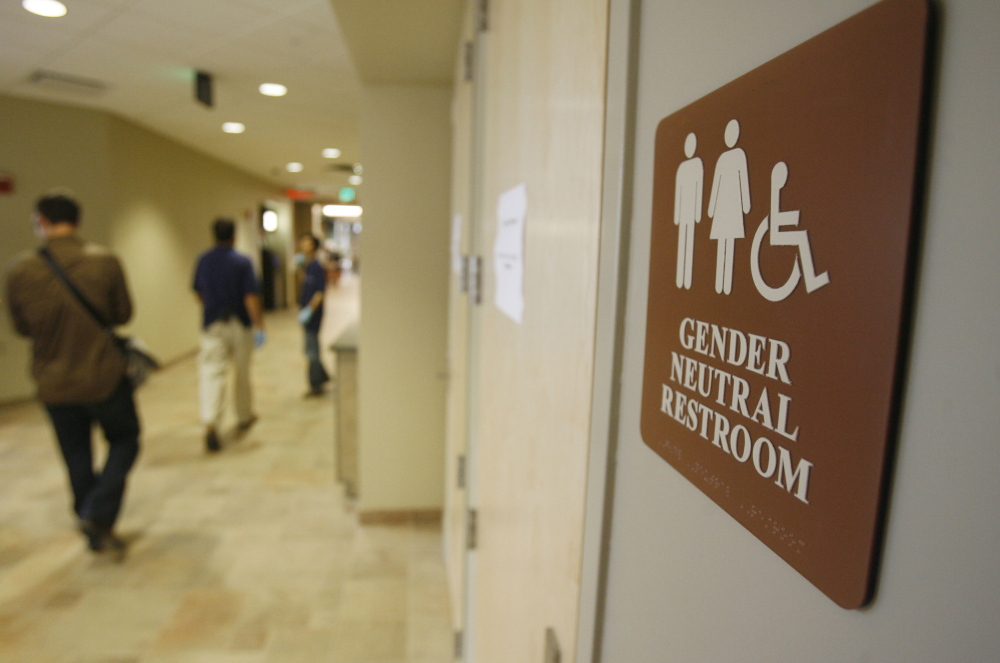Since the federal Departments of Education and Justice issued guidance last month directing public schools to allow transgender students to use restrooms and locker rooms matching their gender identity, ten states have filed suit. Two weeks ago, Maine’s governor — acting as an individual, not a representative of our state government — joined these suits.
As pediatric health care providers who direct medical services for transgender youth in Maine, we applaud the federal government’s action because it protects a particularly vulnerable and often misunderstood segment of our population.
Over the last several weeks, there has been a serious lack of context and understanding of the medical science and health risks faced by transgender individuals, particularly children and adolescents.
As with all other public issues, we cannot make or change legislation — particularly policy intended to create a safe and accessible environment for all children — without fully understanding all of the details. It is essential to educate the public and lawmakers about this complicated and very serious topic.
MANY FACTORS
Sex, typically categorized as male or female, is determined by factors that include chromosomes, gonads, internal and external reproductive organs. Sex is not equivalent to gender identity.
The American Psychological Association defines gender as “a non-binary construct that allows for a range of gender identities and that a person’s gender identity may not align with sex assigned at birth.”
Gender identity is the innermost concept of self as male, female, or somewhere on the gender spectrum. Sex and gender identity align in the majority of the population, and when they do not, individuals may categorize themselves as transgender. Scientific studies indicate that a major component of gender identity is “hard-wired” and, like sexual orientation, is not a choice.
The Pediatric Endocrine Society (PES) does not support the ideology that sex chromosomes or genitalia determines gender identity, and endorses a gender affirmative approach to care provided to transgender youth. Children and adolescents are at risk of suffering mental anguish from discrimination if they do not have a supportive environment in school, including using the restroom or locker room that is consistent with their gender identity.
Anyone who has had the opportunity to work with such youth knows that they merely want to be who they know themselves to be, and to feel safe at school.
The Gender Clinic at the Barbara Bush Children’s Hospital has recently grown exponentially and now provides comprehensive care for more than 130 children and adolescents. Indeed many of these young people are our neighbors, members of our religious communities, and friends of our own children.
For them, the ramifications of ill-informed public policy can be gravely serious. Please consider:
• More than 40 percent of transgender adolescents contemplate suicide and about 25 percent attempt it.
• Rates of depression are 2-3 times higher in transgender youth vs. non-transgender peers.
• Data indicate that many clinically significant mental health issues in transgender adolescents derive from discrimination, peer rejection and lack of social support.
Transgender youth have optimal outcomes when affirmed in their gender identity through support by their families and their environment, including public schools.
A recent study published in the prestigious medical journal “Pediatrics” revealed transgender children who experience positive psychological support have a rate of depression that is markedly reduced.
SAFE ENVIRONMENT
As parents, pediatric health care providers, and members of the Pediatric Endocrine Society’s Special Interest Group (SIG) on Transgender Health, we join other academic professionals and societies involved in the care of children and adolescents in supporting policies that promote a safe and accepting environment, as well as adequate mental health and medical care for gender non-conforming and transgender youth.
We encourage all Mainers to not only understand the medical and health issues involved for transgender children and adolescents, but to also agree with the Maine Supreme Judicial Court, which in 2014 ruled that schools cannot discriminate against transgender students.
We hope that Maine will set an example for the rest of the country and strive to understand these complicated issues, engage in a civil discourse and then take action that emphasizes individual rights, safety and equality.
Jerrold Olshan, MD, and Toni Eimicke, MS, RN, CPNP, are medical providers specializing in pediatric endocrinology and have a special interest in transgender health.
Copy the Story LinkSend questions/comments to the editors.



Success. Please wait for the page to reload. If the page does not reload within 5 seconds, please refresh the page.
Enter your email and password to access comments.
Hi, to comment on stories you must . This profile is in addition to your subscription and website login.
Already have a commenting profile? .
Invalid username/password.
Please check your email to confirm and complete your registration.
Only subscribers are eligible to post comments. Please subscribe or login first for digital access. Here’s why.
Use the form below to reset your password. When you've submitted your account email, we will send an email with a reset code.